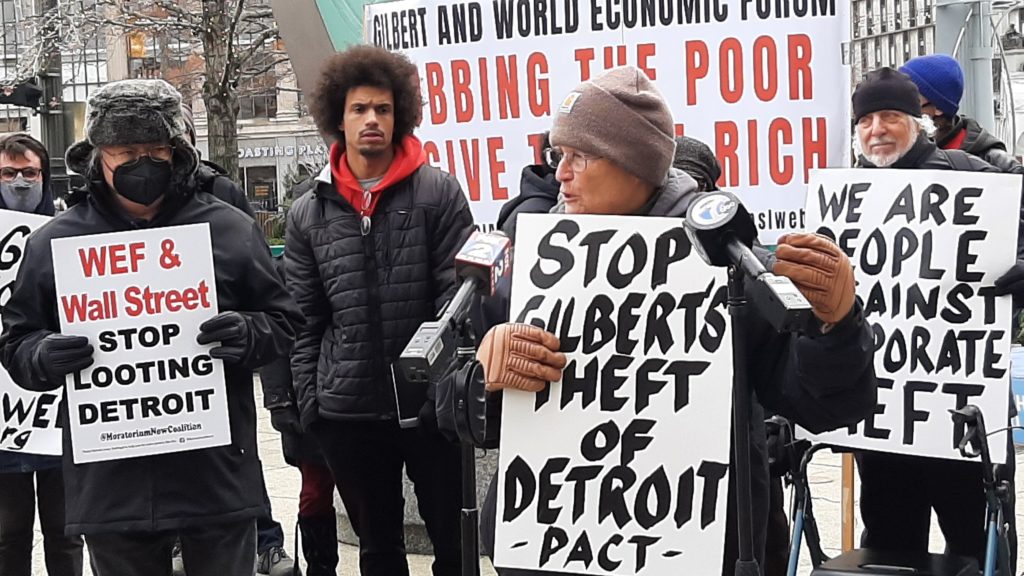On June 21, the Detroit City Council postponed its scheduled vote on billionaire investor Dan Gilbert’s real estate company Bedrock’s request for an additional $60 million tax abatement for its Hudson project in downtown Detroit. The City Council was forced to postpone the vote one week until June 28 in the face of widespread community opposition to the measure.
Community members are mobilizing to attend the hearing to stop this latest giveaway to the rich. They are outraged by this giveaway of public money to Gilbert, Detroit’s primary gentrifier and one of the richest men in the world with a net worth of $16.7 billion.
This tax break is being sought to help fund Gilbert’s construction of new buildings in downtown Detroit, consisting of a 12-story midrise building with more than 500,000 square feet of office and event space, and a 49-story tower with a 225-room hotel and about 100 upper-floor luxury condos or apartments.
Gilbert tax subsidies deprive funding for schools and parks
This new tax abatement request comes on top of more than $600 million in tax subsidies Gilbert has already received for his luxury project. These tax giveaways have been primarily through tax increment funding, wherein Gilbert and Bedrock, with funds funneled through the Detroit Downtown Development Authority, capture the property taxes derived from the increases in property value resulting from the development.
This property tax capture will enable Bedrock to secure about $250 million in financing for its project by authorizing the capture of an average annual $18.56 million in newly generated property taxes across the sites over the next 30 years.
Gilbert also gets to capture approximately $330 million in income tax revenues paid by construction workers on the site, as well as income tax payments over the next 40 years from any workers employed there. He also captures sales and use taxes that would otherwise be paid to the government, totaling another $60 million or so.
These figures all come from the City of Detroit Brownfield Redevelopment Plan on the Hudson’s Block development prepared by Jared Fleisher of Bedrock on Oct. 12, 2017. Fleisher’s recent lies to City Council that schools and other city services will not be impacted by these tax giveaways are corrected by the document he authored, which notes a $230 million direct reduction in local revenue, including $145 million in school operating revenues, a $31 million reduction in revenues from the state education tax, $37 million in reduction to the regional school service authority primarily for bus transportation, and a $15 million reduction in revenue for parks and to maintain the Wayne County Jail.

Gilbert profited from subprime, predatory lending that led to massive foreclosures
Gilbert made his money through his mortgage companies, Quicken Loans and Rocket Mortgage. He profited greatly from the subprime mortgage crisis of 2005 to 2015, where tens of millions of African Americans and Latinos were induced by the banks and financial institutions to take out fraudulent, unpayable mortgage loans.
Detroit, as the city formerly having the largest Black home ownership rate in the United States, was particularly hard hit by this criminal scheme as 65,000 families were driven from their homes as a result of foreclosures stemming from these predatory loans. Many of Detroit’s neighborhoods were destroyed, and the city lost one-quarter of its population from 2005 to 2015.
Gilbert’s Quicken Loans directly foreclosed on 1,084 homes in Detroit, 52% of which are now blighted or abandoned. But its bigger role in the crisis was as the originator of subprime fraudulent loans, which it then would sell to Countrywide, Indy Mac and the other banks, and later to Fannie Mae and Freddie Mac.
Mortgage Fraud Investigators (MFI) Miami researched properties listed on the Wayne County Register of Deeds and looked at original mortgage filings in Detroit that listed Quicken Loans or Rock Financial as the original mortgagee from 2003 to 2007. They sampled 75 homes that had Quicken or Rock Financial as the original mortgage lender. Of the samples, about 71% of properties went into foreclosure within the first 24 to 36 months of being sold on the secondary housing market. Quicken sold these properties to Fannie Mae, Freddie Mac and private mortgage-backed security trusts on Wall Street.
Quicken Loans has also been found guilty of fraudulently and artificially inflating appraisals in loans it originates. In 2016, a federal judge assessed Quicken $11 million in a West Virginia case for these inflated appraisals. The Michigan State Constitution provides that no property should be assessed at more than 50% of the market rate. Some 55% to 85% of properties in Detroit between 2009 and 2015 violated state law through inflated assessments. This resulted in Detroit homeowners being subjected to inflated property tax bills and led to massive property tax foreclosures and home losses. Unfortunately, Michigan and Detroit officials never pursued actions like the West Virginia case.
Gilbert and the banks owe reparations to Detroit
In the last Detroit elections, Detroiters voted to set up a Reparations Taskforce, in part to right the wrongs suffered by Detroiters with regard to housing. Rather than City Council voting more tax breaks for Gilbert to fund developments for the rich, the city should be demanding that Gilbert and all the banks and mortgage companies that caused Detroit’s neighborhoods to be destroyed, pay reparations to the community to rebuild Detroit into the centerpiece for Black home ownership it once was.
These reparations must be administered by the community, not the mayor and other politicians who are at the beck and call of the banks, Gilbert and other developers. Schools must be repaired and rebuilt with drinkable water and safe, comfortable classrooms fit for learning. The residents must have affordable housing and city services for which they have paid exorbitantly over the years. Transportation, clinics, community centers and sports opportunities must be made available to Detroiters with these funds.






